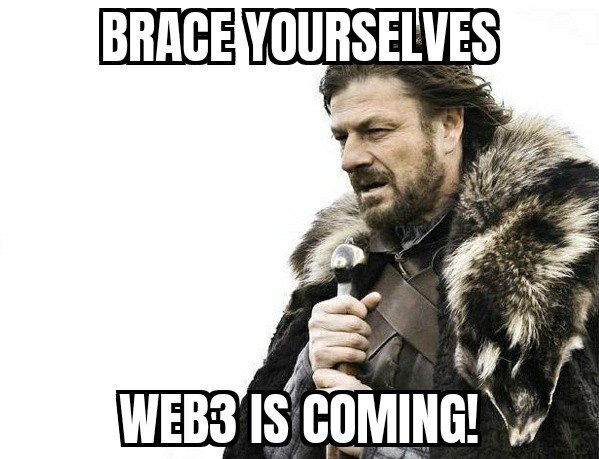In part two of this crypto narratives series, we’re talking about the decentralized web. If you’re not sure why narratives are so important, make sure to check out part one here where I introduce the series.
The decentralized web, or Web 3.0, or Web3, as I’ll refer to it, has several potential narratives that will influence how it drives growth in crypto. These stories about what Web3 can or cannot do for the cryptosphere and the internet in general are somewhat at odds. There’s a bit of a debate going on between some loud voices in crypto and tech broadly. It’s not completely clear yet which narrative will win out, but that’s what we’re here to talk about. Who has the loudest bullhorns and what are they saying?

The three Web3 narratives
I try to keep my ear to the ground for the stories that influential voices are telling about the various crypto sectors. And, recently, I’ve been hearing three different stories related to Web3 and how people inside and outside the crypto community view it.
The first is that Web3 will create a decentralized web that we critically need in the face of more and more centralized companies owning the internet’s infrastructure and data. The second story I’ve been hearing is that, while the decentralized web is a good idea in theory, it’s not possible in reality because it’s too idealistic. The third story is a pretty simple one: “What even tf is Web3?” Meaning, people can’t seem to agree on how to define Web3, so how could we ever hope to see it happen in reality?
There are some influential voices in every camp and they all have their own arguments for which story will play out in reality. I’ll break it down for you and let you decide who’s right.
“It’s a pipedream” narrative
One of the emerging crypto narratives is coming from the likes of Jack Dorsey who certainly has a megaphone in the tech community and, more and more, in the crypto community. Don’t get me started on what I think about Jack’s history re: centralized companies. *cough* Twitter—the censorship capital of the internet *cough.*
Suffice it to say he’s pretty vocally in the camp of Web3 as a pipedream. In a tweet, he said that the decentralized web is anything but decentralized because it’s funded (and therefore owned) by venture capital investors (VCs).
You don’t own “web3.”
The VCs and their LPs do. It will never escape their incentives. It’s ultimately a centralized entity with a different label.
Know what you’re getting into…
— jack
(@jack) December 21, 2021
 And while it’s certainly true that a lot of decentralized web projects get off the ground by raising capital from VCs, that’s only one angle to view it from. Jack and those who agree with him say that governance tokens can just as easily be monopolized—gaining controlling interest for large investors—as traditional corporations.
And while it’s certainly true that a lot of decentralized web projects get off the ground by raising capital from VCs, that’s only one angle to view it from. Jack and those who agree with him say that governance tokens can just as easily be monopolized—gaining controlling interest for large investors—as traditional corporations.
There’s also the problem that a decentralized web means a slower web. And atomized development means there won’t be the kind of concentrated effort that a company like Google or Meta (formerly Facebook) can muster. The people who say that Web3 is a pipedream believe a decentralized internet, even if it’s a noble idea, is simply too idealistic and unreachable.
What even TF is it?
Skeptical stories are not the only hurdle that this Web3 narrative faces. Perhaps an even bigger one is the, “What even tf is Web3?” story. We’ve heard this one from people like Elon Musk who replied to Jack asking if anyone had ever seen Web3 and said in an interview that he doesn’t get it.
Has anyone seen web3? I can’t find it.
— Elon Musk (@elonmusk) December 21, 2021
Others, like the well-known crypto podcaster and trader Cobie, wrote an entire stubstack piece entitled: Wtf is web3? This “what is it” narrative points out that, while there is a lot of chatter and disagreement about the future of the decentralized web, there doesn’t seem to be a solid consensus on what that actually is.
Is the decentralized web primarily putting the architecture of the internet on blockchain and tokenizing everything? Is it the semantic web and AI and the IoT (internet of things)? Is it the spatial web and does that crossover into the metaverse? These things do not have clear-cut majority agreement.
So, if we can’t define Web3, how can we build it? According to Elon: It’s just marketing.
Web3 is coming!

The last and most hopeful crypto narrative about the decentralized web is the story that dreamers and builders prefer to tell—and, truthfully, the venture capitalists. In fact, Marc Andreessen, whose venture capital firm is funding Web3 projects, blocked Jack on Twitter after their scuffle.
The story that Web3 hopefuls tell is that a decentralized web is necessary and critical. The reality on the ground is that Google, Meta, Amazon, and, yes, even Twitter, monopolize control, access, and data on the current internet. So, just because the concept of a decentralized web is ambitious and idealistic, does that mean we should let the corporations continue to own us and our data?
The centralized internet does need to change. Plus, one of the ways that DOAs are meant to work is to decentralize over time. Even if VCs fund projects to get them off the ground, governance should, over time, become decentralized.
Renovating the entire internet will take time and effort. It will take innovation and iteration. What if people had said, “We don’t have Web2 so let’s not build Web1?” Looking back, that seems silly. There always have been and will always be centralizing tendencies in people and companies. That’s exactly why we have to continue to update, upgrade, and improve—that’s the crypto narrative driving Web3 forward.
Investing in Web3 narratives
With these three versions of the crypto narrative for Web3, how should that affect your investments? Well, you could either go with your conviction, or go with which narrative you believe will win in the majority’s minds. Hopefully, those two are the same!
If you, like me, want to see Web3 thrive and take back the internet, hopefully you also believe that’s the narrative that will win out. But even if you’re a bit of a skeptic, you could take the cynical view and capitalize on the gains where you see them. You could…
Trade Web3 tokens: maybe you don’t believe Web3 will come to fruition. That’s okay, but the joke would be on you with Filecoin, Polkadot, Arweave, Oasis, and other Web3 projects that have seen massive returns.
Hodl what you believe in: If you do think Web3 is real, inevitable, and worthwhile, help drive the narrative. Invest in Web3 projects and hold them. When the optimistic decentralized web narrative plays out (I wouldn’t be writing about it if I didn’t think it will), hodl!
Conclusion
The skeptical crypto narratives surrounding Web3 have landed some punches lately, but what else is new? There was a debate about whether the internet would last. There was a debate about smartphones. There was a debate about Uber and Airbnb. There was a debate about Bitcoin. But despite conflicting narratives, skeptics often miss out. Which narrative do you think will win?
About the Author

Michael Hearne
About Decentral Publishing
Decentral Publishing is dedicated to producing content through our blog, eBooks, and docu-series to help our readers deepen their knowledge of cryptocurrency and related topics. Do you have a fresh perspective or any other topics worth discussing? Keep the conversation going with us online at: Facebook, Twitter, Instagram, and LinkedIn.


